Mega Events and Sustainability: A Case Study of London Olympics 2012
VerifiedAdded on 2024/05/31
|9
|1930
|128
Report
AI Summary
This report examines the sustainability issues surrounding the London Olympics 2012, a mega-event that brought both economic benefits and environmental challenges. While the Olympics aimed to be the 'greenest ever,' it faced shortcomings in areas like air quality and renewable energy implementation. The report discusses the event's successes, such as job creation and infrastructure development, alongside its failures, including high carbon emissions and criticisms of carbon offsetting policies. It questions whether true sustainability is achievable at such large-scale events, highlighting the importance of long-term planning and practical steps to reduce environmental impact, and suggests future mega-events should prioritize emission reduction and legacy planning. The report concludes that while challenges remain, the London Olympics 2012 provided valuable lessons for integrating sustainability into future mega-events.

MEGA EVENTS
Paraphrase This Document
Need a fresh take? Get an instant paraphrase of this document with our AI Paraphraser

Table of Contents
INTRODUCTION................................................................................................................................3
BODY................................................................................................................................................4
CONCLUSION...................................................................................................................................9
REFERENCES...................................................................................................................................10
2
INTRODUCTION................................................................................................................................3
BODY................................................................................................................................................4
CONCLUSION...................................................................................................................................9
REFERENCES...................................................................................................................................10
2
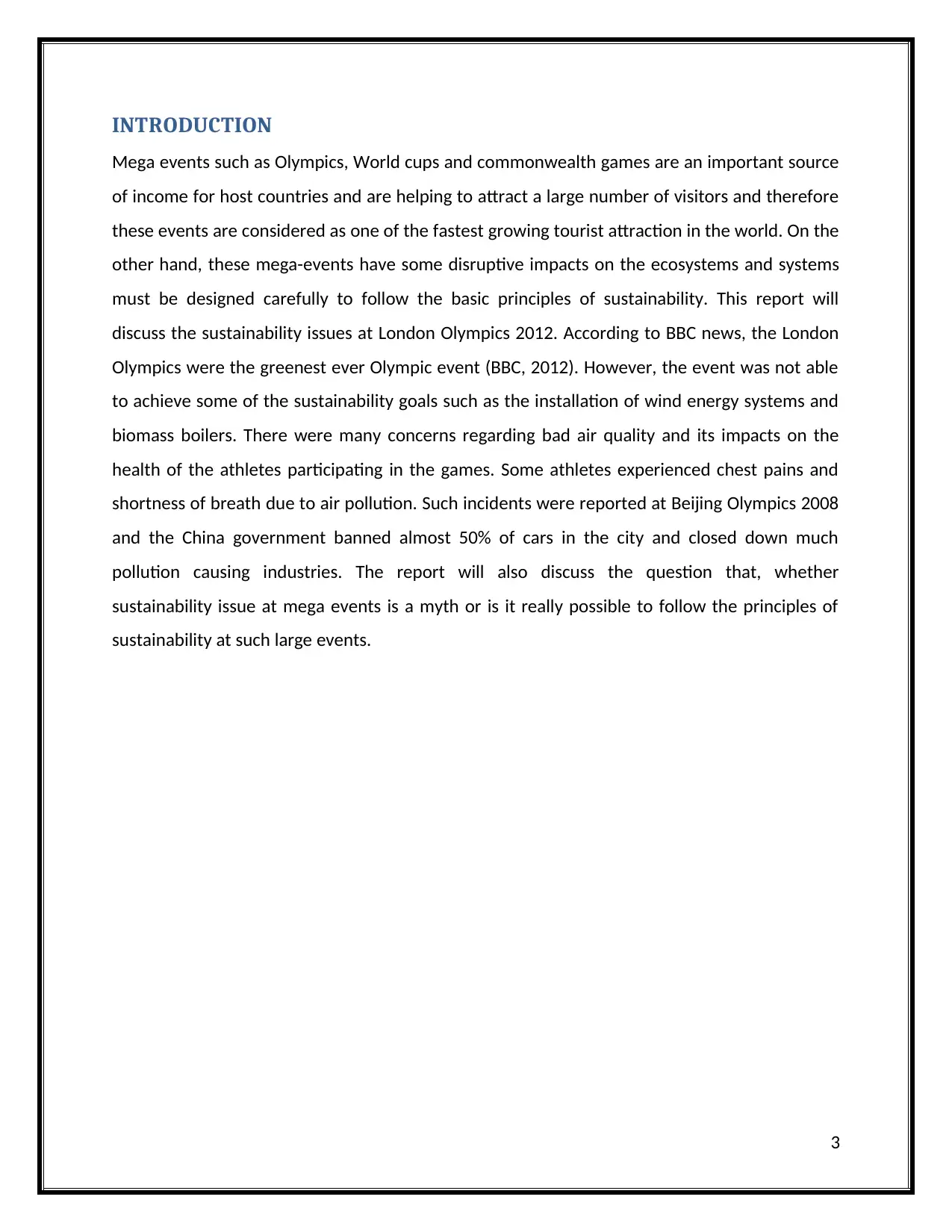
INTRODUCTION
Mega events such as Olympics, World cups and commonwealth games are an important source
of income for host countries and are helping to attract a large number of visitors and therefore
these events are considered as one of the fastest growing tourist attraction in the world. On the
other hand, these mega-events have some disruptive impacts on the ecosystems and systems
must be designed carefully to follow the basic principles of sustainability. This report will
discuss the sustainability issues at London Olympics 2012. According to BBC news, the London
Olympics were the greenest ever Olympic event (BBC, 2012). However, the event was not able
to achieve some of the sustainability goals such as the installation of wind energy systems and
biomass boilers. There were many concerns regarding bad air quality and its impacts on the
health of the athletes participating in the games. Some athletes experienced chest pains and
shortness of breath due to air pollution. Such incidents were reported at Beijing Olympics 2008
and the China government banned almost 50% of cars in the city and closed down much
pollution causing industries. The report will also discuss the question that, whether
sustainability issue at mega events is a myth or is it really possible to follow the principles of
sustainability at such large events.
3
Mega events such as Olympics, World cups and commonwealth games are an important source
of income for host countries and are helping to attract a large number of visitors and therefore
these events are considered as one of the fastest growing tourist attraction in the world. On the
other hand, these mega-events have some disruptive impacts on the ecosystems and systems
must be designed carefully to follow the basic principles of sustainability. This report will
discuss the sustainability issues at London Olympics 2012. According to BBC news, the London
Olympics were the greenest ever Olympic event (BBC, 2012). However, the event was not able
to achieve some of the sustainability goals such as the installation of wind energy systems and
biomass boilers. There were many concerns regarding bad air quality and its impacts on the
health of the athletes participating in the games. Some athletes experienced chest pains and
shortness of breath due to air pollution. Such incidents were reported at Beijing Olympics 2008
and the China government banned almost 50% of cars in the city and closed down much
pollution causing industries. The report will also discuss the question that, whether
sustainability issue at mega events is a myth or is it really possible to follow the principles of
sustainability at such large events.
3
⊘ This is a preview!⊘
Do you want full access?
Subscribe today to unlock all pages.

Trusted by 1+ million students worldwide
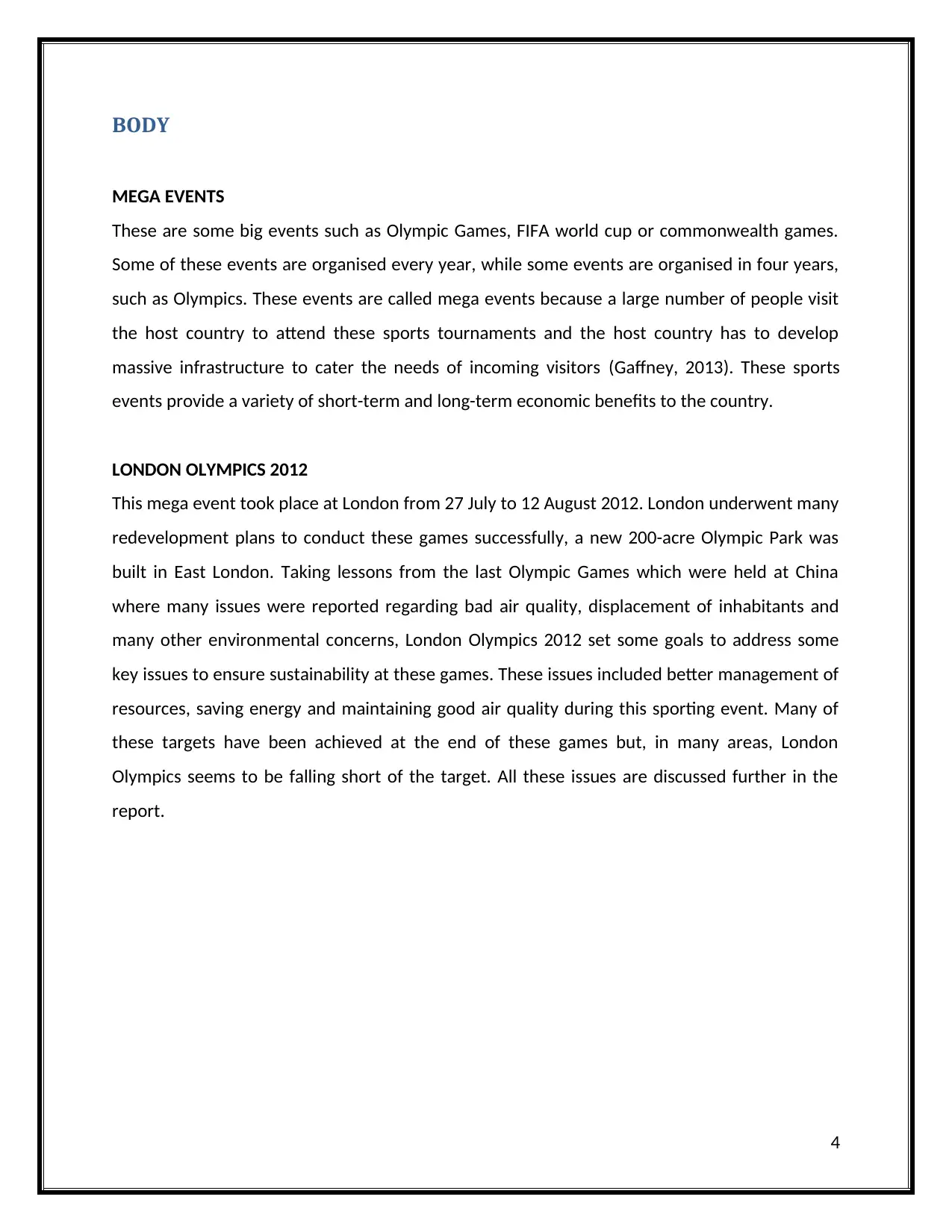
BODY
MEGA EVENTS
These are some big events such as Olympic Games, FIFA world cup or commonwealth games.
Some of these events are organised every year, while some events are organised in four years,
such as Olympics. These events are called mega events because a large number of people visit
the host country to attend these sports tournaments and the host country has to develop
massive infrastructure to cater the needs of incoming visitors (Gaffney, 2013). These sports
events provide a variety of short-term and long-term economic benefits to the country.
LONDON OLYMPICS 2012
This mega event took place at London from 27 July to 12 August 2012. London underwent many
redevelopment plans to conduct these games successfully, a new 200-acre Olympic Park was
built in East London. Taking lessons from the last Olympic Games which were held at China
where many issues were reported regarding bad air quality, displacement of inhabitants and
many other environmental concerns, London Olympics 2012 set some goals to address some
key issues to ensure sustainability at these games. These issues included better management of
resources, saving energy and maintaining good air quality during this sporting event. Many of
these targets have been achieved at the end of these games but, in many areas, London
Olympics seems to be falling short of the target. All these issues are discussed further in the
report.
4
MEGA EVENTS
These are some big events such as Olympic Games, FIFA world cup or commonwealth games.
Some of these events are organised every year, while some events are organised in four years,
such as Olympics. These events are called mega events because a large number of people visit
the host country to attend these sports tournaments and the host country has to develop
massive infrastructure to cater the needs of incoming visitors (Gaffney, 2013). These sports
events provide a variety of short-term and long-term economic benefits to the country.
LONDON OLYMPICS 2012
This mega event took place at London from 27 July to 12 August 2012. London underwent many
redevelopment plans to conduct these games successfully, a new 200-acre Olympic Park was
built in East London. Taking lessons from the last Olympic Games which were held at China
where many issues were reported regarding bad air quality, displacement of inhabitants and
many other environmental concerns, London Olympics 2012 set some goals to address some
key issues to ensure sustainability at these games. These issues included better management of
resources, saving energy and maintaining good air quality during this sporting event. Many of
these targets have been achieved at the end of these games but, in many areas, London
Olympics seems to be falling short of the target. All these issues are discussed further in the
report.
4
Paraphrase This Document
Need a fresh take? Get an instant paraphrase of this document with our AI Paraphraser
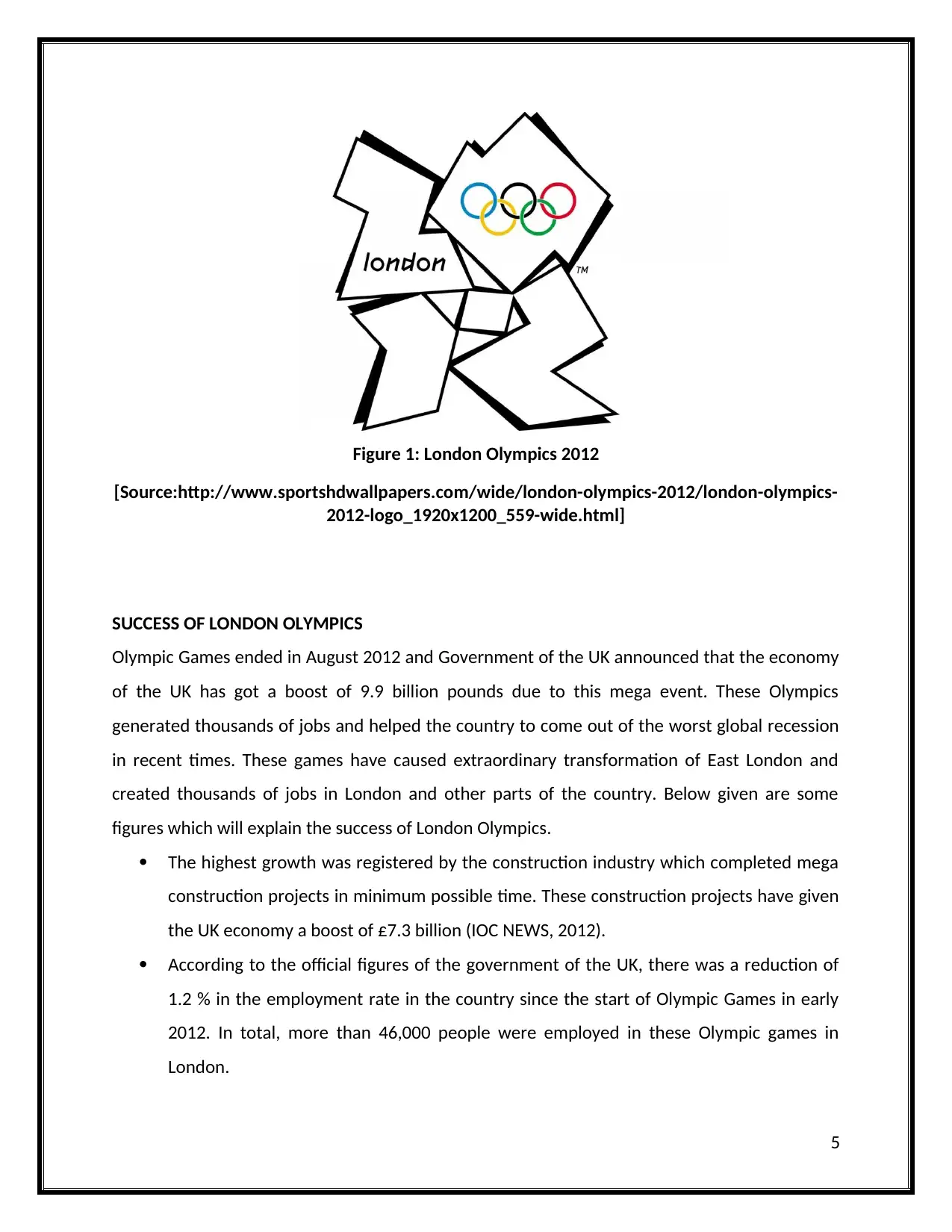
Figure 1: London Olympics 2012
[Source:http://www.sportshdwallpapers.com/wide/london-olympics-2012/london-olympics-
2012-logo_1920x1200_559-wide.html]
SUCCESS OF LONDON OLYMPICS
Olympic Games ended in August 2012 and Government of the UK announced that the economy
of the UK has got a boost of 9.9 billion pounds due to this mega event. These Olympics
generated thousands of jobs and helped the country to come out of the worst global recession
in recent times. These games have caused extraordinary transformation of East London and
created thousands of jobs in London and other parts of the country. Below given are some
figures which will explain the success of London Olympics.
The highest growth was registered by the construction industry which completed mega
construction projects in minimum possible time. These construction projects have given
the UK economy a boost of £7.3 billion (IOC NEWS, 2012).
According to the official figures of the government of the UK, there was a reduction of
1.2 % in the employment rate in the country since the start of Olympic Games in early
2012. In total, more than 46,000 people were employed in these Olympic games in
London.
5
[Source:http://www.sportshdwallpapers.com/wide/london-olympics-2012/london-olympics-
2012-logo_1920x1200_559-wide.html]
SUCCESS OF LONDON OLYMPICS
Olympic Games ended in August 2012 and Government of the UK announced that the economy
of the UK has got a boost of 9.9 billion pounds due to this mega event. These Olympics
generated thousands of jobs and helped the country to come out of the worst global recession
in recent times. These games have caused extraordinary transformation of East London and
created thousands of jobs in London and other parts of the country. Below given are some
figures which will explain the success of London Olympics.
The highest growth was registered by the construction industry which completed mega
construction projects in minimum possible time. These construction projects have given
the UK economy a boost of £7.3 billion (IOC NEWS, 2012).
According to the official figures of the government of the UK, there was a reduction of
1.2 % in the employment rate in the country since the start of Olympic Games in early
2012. In total, more than 46,000 people were employed in these Olympic games in
London.
5
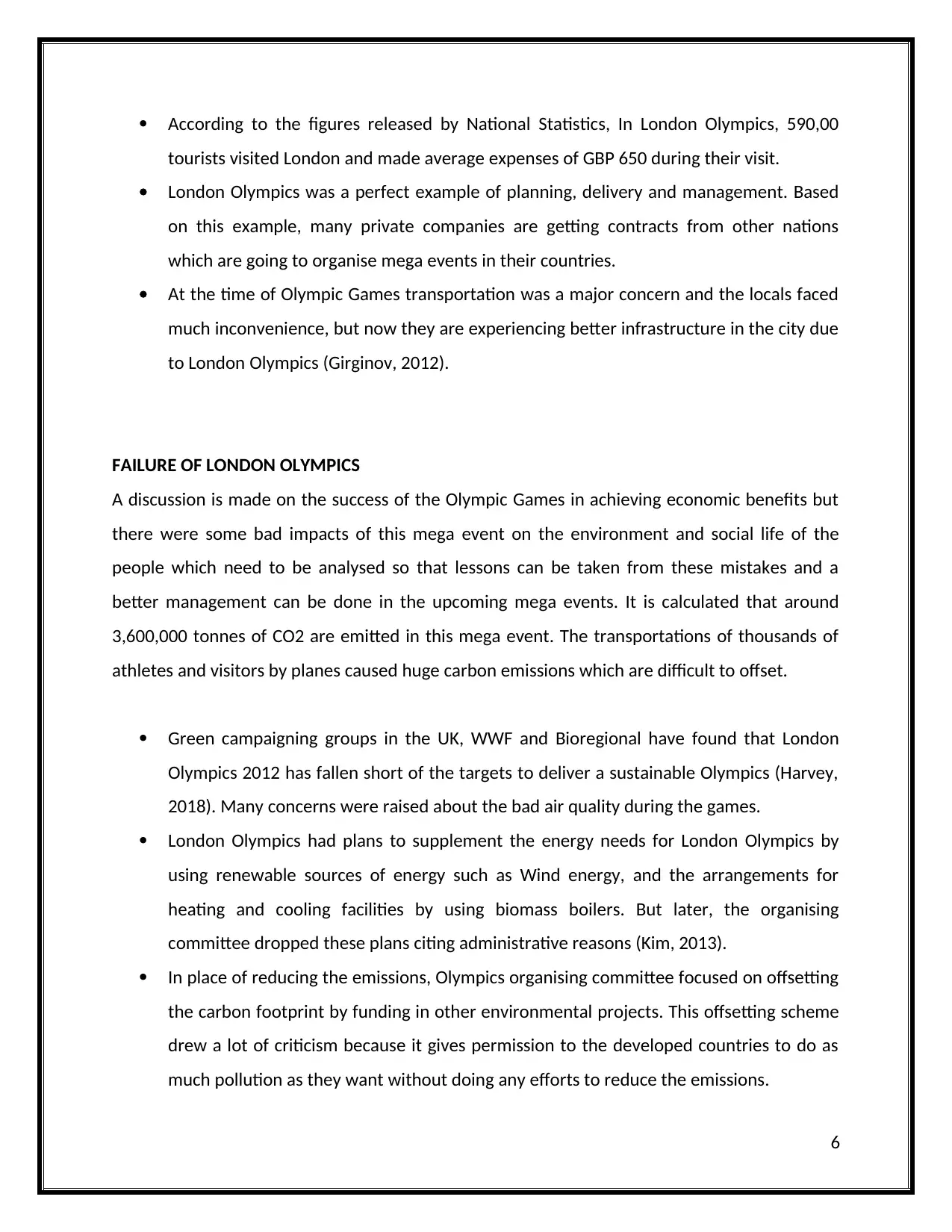
According to the figures released by National Statistics, In London Olympics, 590,00
tourists visited London and made average expenses of GBP 650 during their visit.
London Olympics was a perfect example of planning, delivery and management. Based
on this example, many private companies are getting contracts from other nations
which are going to organise mega events in their countries.
At the time of Olympic Games transportation was a major concern and the locals faced
much inconvenience, but now they are experiencing better infrastructure in the city due
to London Olympics (Girginov, 2012).
FAILURE OF LONDON OLYMPICS
A discussion is made on the success of the Olympic Games in achieving economic benefits but
there were some bad impacts of this mega event on the environment and social life of the
people which need to be analysed so that lessons can be taken from these mistakes and a
better management can be done in the upcoming mega events. It is calculated that around
3,600,000 tonnes of CO2 are emitted in this mega event. The transportations of thousands of
athletes and visitors by planes caused huge carbon emissions which are difficult to offset.
Green campaigning groups in the UK, WWF and Bioregional have found that London
Olympics 2012 has fallen short of the targets to deliver a sustainable Olympics (Harvey,
2018). Many concerns were raised about the bad air quality during the games.
London Olympics had plans to supplement the energy needs for London Olympics by
using renewable sources of energy such as Wind energy, and the arrangements for
heating and cooling facilities by using biomass boilers. But later, the organising
committee dropped these plans citing administrative reasons (Kim, 2013).
In place of reducing the emissions, Olympics organising committee focused on offsetting
the carbon footprint by funding in other environmental projects. This offsetting scheme
drew a lot of criticism because it gives permission to the developed countries to do as
much pollution as they want without doing any efforts to reduce the emissions.
6
tourists visited London and made average expenses of GBP 650 during their visit.
London Olympics was a perfect example of planning, delivery and management. Based
on this example, many private companies are getting contracts from other nations
which are going to organise mega events in their countries.
At the time of Olympic Games transportation was a major concern and the locals faced
much inconvenience, but now they are experiencing better infrastructure in the city due
to London Olympics (Girginov, 2012).
FAILURE OF LONDON OLYMPICS
A discussion is made on the success of the Olympic Games in achieving economic benefits but
there were some bad impacts of this mega event on the environment and social life of the
people which need to be analysed so that lessons can be taken from these mistakes and a
better management can be done in the upcoming mega events. It is calculated that around
3,600,000 tonnes of CO2 are emitted in this mega event. The transportations of thousands of
athletes and visitors by planes caused huge carbon emissions which are difficult to offset.
Green campaigning groups in the UK, WWF and Bioregional have found that London
Olympics 2012 has fallen short of the targets to deliver a sustainable Olympics (Harvey,
2018). Many concerns were raised about the bad air quality during the games.
London Olympics had plans to supplement the energy needs for London Olympics by
using renewable sources of energy such as Wind energy, and the arrangements for
heating and cooling facilities by using biomass boilers. But later, the organising
committee dropped these plans citing administrative reasons (Kim, 2013).
In place of reducing the emissions, Olympics organising committee focused on offsetting
the carbon footprint by funding in other environmental projects. This offsetting scheme
drew a lot of criticism because it gives permission to the developed countries to do as
much pollution as they want without doing any efforts to reduce the emissions.
6
⊘ This is a preview!⊘
Do you want full access?
Subscribe today to unlock all pages.

Trusted by 1+ million students worldwide
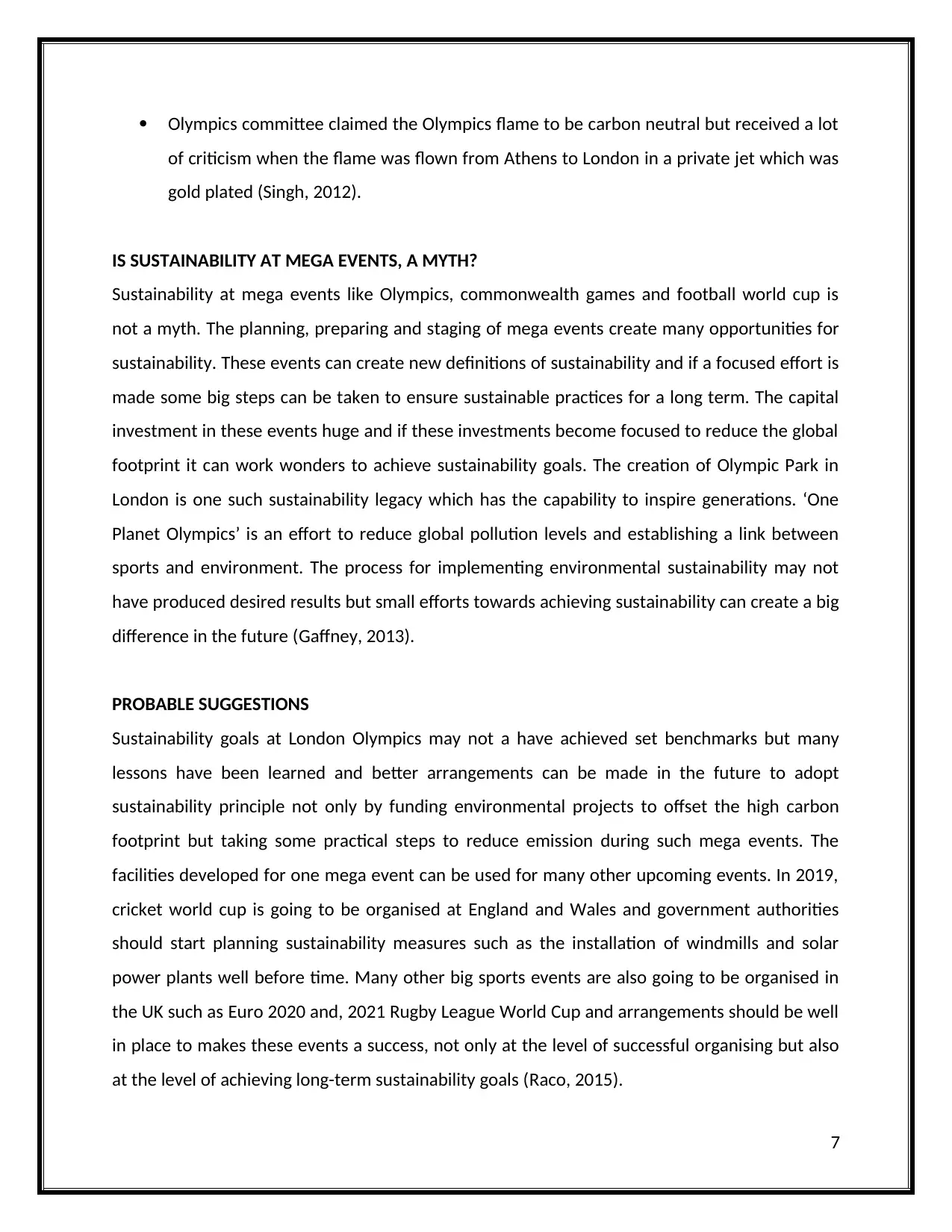
Olympics committee claimed the Olympics flame to be carbon neutral but received a lot
of criticism when the flame was flown from Athens to London in a private jet which was
gold plated (Singh, 2012).
IS SUSTAINABILITY AT MEGA EVENTS, A MYTH?
Sustainability at mega events like Olympics, commonwealth games and football world cup is
not a myth. The planning, preparing and staging of mega events create many opportunities for
sustainability. These events can create new definitions of sustainability and if a focused effort is
made some big steps can be taken to ensure sustainable practices for a long term. The capital
investment in these events huge and if these investments become focused to reduce the global
footprint it can work wonders to achieve sustainability goals. The creation of Olympic Park in
London is one such sustainability legacy which has the capability to inspire generations. ‘One
Planet Olympics’ is an effort to reduce global pollution levels and establishing a link between
sports and environment. The process for implementing environmental sustainability may not
have produced desired results but small efforts towards achieving sustainability can create a big
difference in the future (Gaffney, 2013).
PROBABLE SUGGESTIONS
Sustainability goals at London Olympics may not a have achieved set benchmarks but many
lessons have been learned and better arrangements can be made in the future to adopt
sustainability principle not only by funding environmental projects to offset the high carbon
footprint but taking some practical steps to reduce emission during such mega events. The
facilities developed for one mega event can be used for many other upcoming events. In 2019,
cricket world cup is going to be organised at England and Wales and government authorities
should start planning sustainability measures such as the installation of windmills and solar
power plants well before time. Many other big sports events are also going to be organised in
the UK such as Euro 2020 and, 2021 Rugby League World Cup and arrangements should be well
in place to makes these events a success, not only at the level of successful organising but also
at the level of achieving long-term sustainability goals (Raco, 2015).
7
of criticism when the flame was flown from Athens to London in a private jet which was
gold plated (Singh, 2012).
IS SUSTAINABILITY AT MEGA EVENTS, A MYTH?
Sustainability at mega events like Olympics, commonwealth games and football world cup is
not a myth. The planning, preparing and staging of mega events create many opportunities for
sustainability. These events can create new definitions of sustainability and if a focused effort is
made some big steps can be taken to ensure sustainable practices for a long term. The capital
investment in these events huge and if these investments become focused to reduce the global
footprint it can work wonders to achieve sustainability goals. The creation of Olympic Park in
London is one such sustainability legacy which has the capability to inspire generations. ‘One
Planet Olympics’ is an effort to reduce global pollution levels and establishing a link between
sports and environment. The process for implementing environmental sustainability may not
have produced desired results but small efforts towards achieving sustainability can create a big
difference in the future (Gaffney, 2013).
PROBABLE SUGGESTIONS
Sustainability goals at London Olympics may not a have achieved set benchmarks but many
lessons have been learned and better arrangements can be made in the future to adopt
sustainability principle not only by funding environmental projects to offset the high carbon
footprint but taking some practical steps to reduce emission during such mega events. The
facilities developed for one mega event can be used for many other upcoming events. In 2019,
cricket world cup is going to be organised at England and Wales and government authorities
should start planning sustainability measures such as the installation of windmills and solar
power plants well before time. Many other big sports events are also going to be organised in
the UK such as Euro 2020 and, 2021 Rugby League World Cup and arrangements should be well
in place to makes these events a success, not only at the level of successful organising but also
at the level of achieving long-term sustainability goals (Raco, 2015).
7
Paraphrase This Document
Need a fresh take? Get an instant paraphrase of this document with our AI Paraphraser
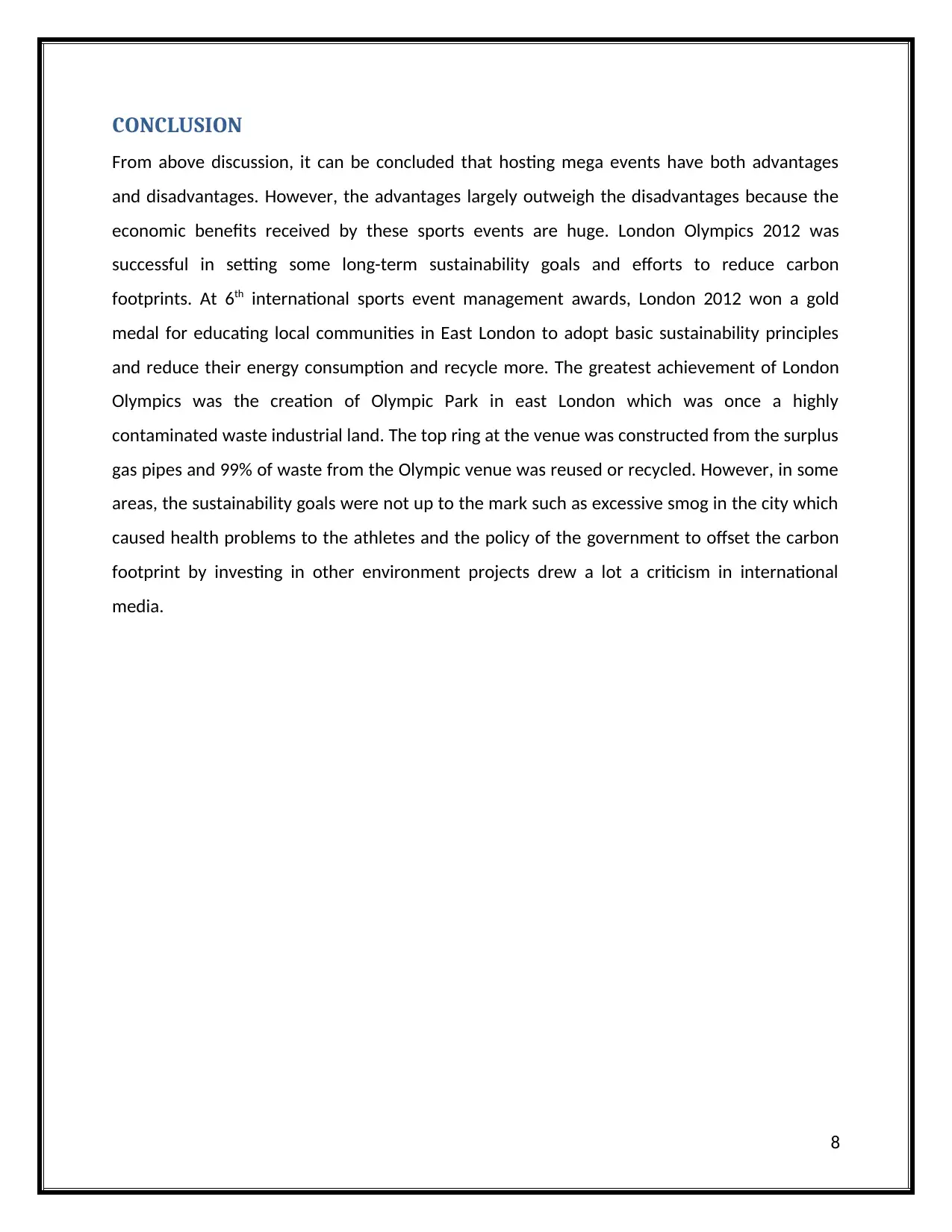
CONCLUSION
From above discussion, it can be concluded that hosting mega events have both advantages
and disadvantages. However, the advantages largely outweigh the disadvantages because the
economic benefits received by these sports events are huge. London Olympics 2012 was
successful in setting some long-term sustainability goals and efforts to reduce carbon
footprints. At 6th international sports event management awards, London 2012 won a gold
medal for educating local communities in East London to adopt basic sustainability principles
and reduce their energy consumption and recycle more. The greatest achievement of London
Olympics was the creation of Olympic Park in east London which was once a highly
contaminated waste industrial land. The top ring at the venue was constructed from the surplus
gas pipes and 99% of waste from the Olympic venue was reused or recycled. However, in some
areas, the sustainability goals were not up to the mark such as excessive smog in the city which
caused health problems to the athletes and the policy of the government to offset the carbon
footprint by investing in other environment projects drew a lot a criticism in international
media.
8
From above discussion, it can be concluded that hosting mega events have both advantages
and disadvantages. However, the advantages largely outweigh the disadvantages because the
economic benefits received by these sports events are huge. London Olympics 2012 was
successful in setting some long-term sustainability goals and efforts to reduce carbon
footprints. At 6th international sports event management awards, London 2012 won a gold
medal for educating local communities in East London to adopt basic sustainability principles
and reduce their energy consumption and recycle more. The greatest achievement of London
Olympics was the creation of Olympic Park in east London which was once a highly
contaminated waste industrial land. The top ring at the venue was constructed from the surplus
gas pipes and 99% of waste from the Olympic venue was reused or recycled. However, in some
areas, the sustainability goals were not up to the mark such as excessive smog in the city which
caused health problems to the athletes and the policy of the government to offset the carbon
footprint by investing in other environment projects drew a lot a criticism in international
media.
8
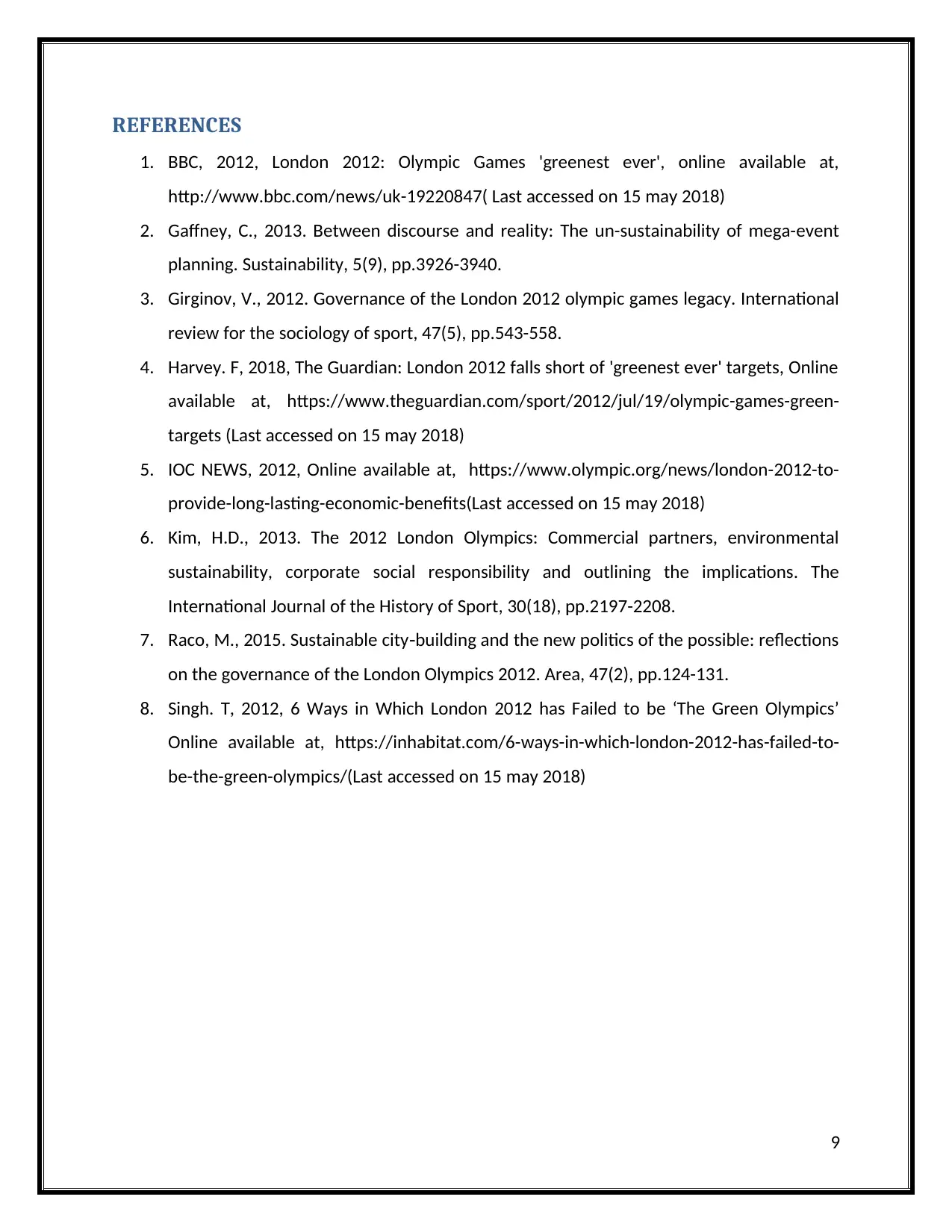
REFERENCES
1. BBC, 2012, London 2012: Olympic Games 'greenest ever', online available at,
http://www.bbc.com/news/uk-19220847( Last accessed on 15 may 2018)
2. Gaffney, C., 2013. Between discourse and reality: The un-sustainability of mega-event
planning. Sustainability, 5(9), pp.3926-3940.
3. Girginov, V., 2012. Governance of the London 2012 olympic games legacy. International
review for the sociology of sport, 47(5), pp.543-558.
4. Harvey. F, 2018, The Guardian: London 2012 falls short of 'greenest ever' targets, Online
available at, https://www.theguardian.com/sport/2012/jul/19/olympic-games-green-
targets (Last accessed on 15 may 2018)
5. IOC NEWS, 2012, Online available at, https://www.olympic.org/news/london-2012-to-
provide-long-lasting-economic-benefits(Last accessed on 15 may 2018)
6. Kim, H.D., 2013. The 2012 London Olympics: Commercial partners, environmental
sustainability, corporate social responsibility and outlining the implications. The
International Journal of the History of Sport, 30(18), pp.2197-2208.
7. Raco, M., 2015. Sustainable city building and the new politics of the possible: reflections‐
on the governance of the London Olympics 2012. Area, 47(2), pp.124-131.
8. Singh. T, 2012, 6 Ways in Which London 2012 has Failed to be ‘The Green Olympics’
Online available at, https://inhabitat.com/6-ways-in-which-london-2012-has-failed-to-
be-the-green-olympics/(Last accessed on 15 may 2018)
9
1. BBC, 2012, London 2012: Olympic Games 'greenest ever', online available at,
http://www.bbc.com/news/uk-19220847( Last accessed on 15 may 2018)
2. Gaffney, C., 2013. Between discourse and reality: The un-sustainability of mega-event
planning. Sustainability, 5(9), pp.3926-3940.
3. Girginov, V., 2012. Governance of the London 2012 olympic games legacy. International
review for the sociology of sport, 47(5), pp.543-558.
4. Harvey. F, 2018, The Guardian: London 2012 falls short of 'greenest ever' targets, Online
available at, https://www.theguardian.com/sport/2012/jul/19/olympic-games-green-
targets (Last accessed on 15 may 2018)
5. IOC NEWS, 2012, Online available at, https://www.olympic.org/news/london-2012-to-
provide-long-lasting-economic-benefits(Last accessed on 15 may 2018)
6. Kim, H.D., 2013. The 2012 London Olympics: Commercial partners, environmental
sustainability, corporate social responsibility and outlining the implications. The
International Journal of the History of Sport, 30(18), pp.2197-2208.
7. Raco, M., 2015. Sustainable city building and the new politics of the possible: reflections‐
on the governance of the London Olympics 2012. Area, 47(2), pp.124-131.
8. Singh. T, 2012, 6 Ways in Which London 2012 has Failed to be ‘The Green Olympics’
Online available at, https://inhabitat.com/6-ways-in-which-london-2012-has-failed-to-
be-the-green-olympics/(Last accessed on 15 may 2018)
9
⊘ This is a preview!⊘
Do you want full access?
Subscribe today to unlock all pages.

Trusted by 1+ million students worldwide
1 out of 9
Related Documents
Your All-in-One AI-Powered Toolkit for Academic Success.
+13062052269
info@desklib.com
Available 24*7 on WhatsApp / Email
![[object Object]](/_next/static/media/star-bottom.7253800d.svg)
Unlock your academic potential
Copyright © 2020–2026 A2Z Services. All Rights Reserved. Developed and managed by ZUCOL.





